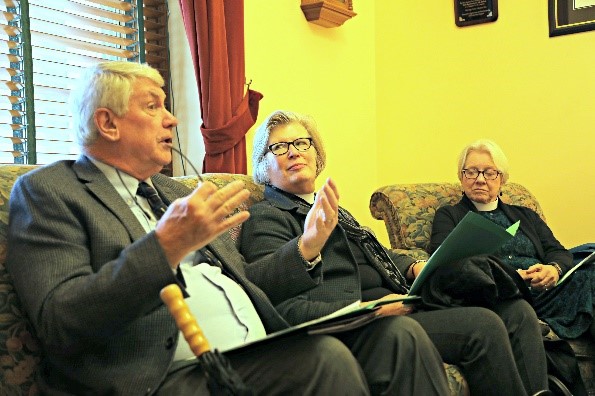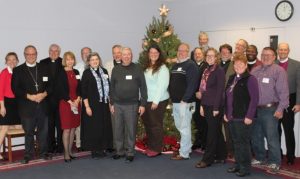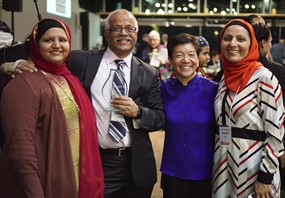ELCA Advocacy Office, Washington, D.C.
MARCH 21, PRAY. FAST. ACT: The March day to #PrayFastAct is Wednesday, March 21! This month we focus on international programs that support women and girls overseas. Although the U.S. government has historically been a leader in funding programs that address the needs of women and girls globally, there are indications that such initiatives are in danger of being significantly reduced or eliminated.
We are all one in Jesus Christ, and, therefore, must work to dismantle structures and norms that allow gender inequality to thrive. Studies show that when women and girls are meaningfully included in all aspects of decision-making, countries are more likely to be peaceful and prosper economically. Let us take action by asking Congress to protect programs that address the needs of women and girls around the world. ELCA Advocacy and The Episcopal Church will share resources and ways to take action later this month.
CLEAN-POWER PLAN REVISION: The ELCA submitted comments to the Environmental Protection Agency (EPA) on proposed state guidelines for greenhouse gas emissions from existing power plants. This rule will be the replacement for the Clean Power Plan rule. We asked for a common-sense rule that is protective of the environment and considers the needs of those whose livelihoods depend on the electric generation sector.
An EPA representative responded immediately to discuss ways for collaborating on environmental justice issues. ELCA Advocacy will continue to work toward developing plans around a celebration of Earth Day.
JOIN LUTHERANS AT ECUMENICAL ADVOCACY DAYS: Now is the time to register for the 2018 Ecumenical Advocacy Days! Ecumenical Advocacy Days, an annual weekend-long conference, will be April 20-23 in Washington, D.C. This year’s gathering theme, “A World Uprooted: Responding to Migrants, Refugees and Displaced People,” will offer ELCA leaders an opportunity to worship and learn together, while honing their advocacy and organizing skills. Lutheran participants will have opportunities to connect at an ELCA reception at the Saturday evening denominational time and at our ELCA Advocacy exhibit booth. You can register for Ecumenical Advocacy Days by clicking here. We hope to see you there!
DACA: In February, the Senate voted down multiple immigration bills that would have provided a pathway to citizenship for people without legal status who were brought to the U.S. as children, also known as Dreamers. There are no current plans to bring additional legislation to the Senate or House floors before the March 5 deadline when the Deferred Action for Childhood Arrivals (DACA) program ends. However, thanks to the Supreme Court’s decision not to rule on a lower court’s decision, young people who have DACA status can continue to apply for renewal beyond the March 5 deadline.
GUN CONTROL POLICY: A number of gun control policies are being proposed from all corners in response to the deaths in Parkland, Fla. on Feb. 14, Ash Wednesday. We continue to track these efforts and are working to advance ELCA support in both legislative and public opportunities as developments unfold. In response to the ELCA Synod Bishop’s Statement of Support for participation in the March on Our Lives, we will offer a gathering opportunity for Lutherans in advance of the Washington D.C. event on March 24th. Follow our social media for details.
SUPPLEMENTAL NUTRITION ASSISTANCE PROGRAM: The Department of Agriculture released a notice of proposed rule making that would affect the Supplemental Nutrition Assistance Program. We are soon releasing resources to support and engage Lutherans in the comment process (ends April 18) and to encourage Congress to mitigate any negative effects people in the program.
Lutheran Office for World Community, United Nations, New York, N.Y.
Dennis Frado, director
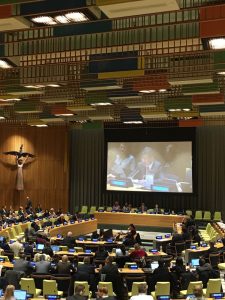 GLOBAL COMPACT ON MIGRATION: Formal negotiations finally got started last month toward a Global Compact on Migration to be adopted by year’s end. Additional rounds are scheduled to occur monthly from now through July. Statements by member states on a “zero draft” put forward by co-facilitators Mexico and Switzerland varied considerably from strong affirmations of the human rights of migrants to warnings that the text not impinge upon national sovereignty or set international standards for migrants’ identification and documentation. The draft sets forth 22 proposed objectives for safe, orderly and regular migration and an outline for implementation and follow-up.
GLOBAL COMPACT ON MIGRATION: Formal negotiations finally got started last month toward a Global Compact on Migration to be adopted by year’s end. Additional rounds are scheduled to occur monthly from now through July. Statements by member states on a “zero draft” put forward by co-facilitators Mexico and Switzerland varied considerably from strong affirmations of the human rights of migrants to warnings that the text not impinge upon national sovereignty or set international standards for migrants’ identification and documentation. The draft sets forth 22 proposed objectives for safe, orderly and regular migration and an outline for implementation and follow-up.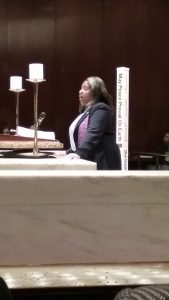
WORLD INTERFAITH HARMONY WEEK: The United Nations observed World Interfaith Harmony Week during the first week of February with midweek worship at the Church Center for the United Nations sponsored by the Committee of Religious NGOs of the United Nations.
Participants were welcomed by the Rev. Dionne Boissière, Tillman Chapel chaplain, and worship was moderated by Swami Parameshananda and Richard Jordan. Faith tradition representatives included the World Peace Prayer Society, the Holy See, Judaism, Won Buddhism, Shinto, Baha’i, the Episcopal Church, Aztec Conchera, Hinduism, Islam, Mennonites, and the Light of Awareness International Spiritual Family. A reflection was offered by Nassir Abdulaziz Al-Nasser, high representative for the United Nations Alliance of Civilizations. Music, dance and choral song from diverse traditions rounded out the afternoon.
California
Mark Carlson, Lutheran Office of Public Policy loppca.org
2018 BALLOT MEASURES: The Lutheran Office of Public Policy–California endorsed the campaign for Proposition 68, a parks and water bond on the June ballot. $725 million is earmarked for parks in underserved communities. We also joined the campaign for a $4 billion housing bond on the November ballot. Several other measures on the June ballot, as well as initiatives in circulation for the November ballot, will be discussed at the March 17 Policy Council meeting.
CARE FOR CREATION: LOPP-CA joined an updated coalition letter supporting legislation to establish a fee to fund programs that provide safe, affordable drinking water to disadvantaged communities affected by contamination, drought and financial inability to build or connect to public water systems. LOPP-CA was a co-sponsor of the Green California Summit and Reception, which featured a plenary panel on the Me Too movement and sexual misconduct and discrimination and harassment (including gender identity conce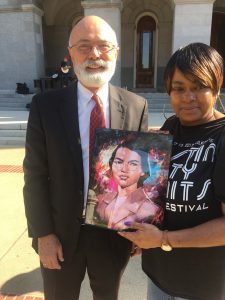 rns) in the Capitol community.
rns) in the Capitol community.
RACIAL JUSTICE: LOPP-CA Director Mark Carlson was invited to give the opening prayer at a birthday celebration for Rosa Parks on the west steps of the Capitol. We worked with the Belfry Lutheran Episcopal Campus Ministry to arrange for their St. Augustine lecturer, the Rev. Robert W. Lee IV, a descendant of Gen. Robert E. Lee’s family and critic of displaying Confederate monuments, to give the invocation at a Senate floor session. We also hosted a coffee for faith leaders, toured the Unity Center and classroom at the California Museum, and provided some meditative moments in the Civil War Grove in Capitol Park that has trees from sites like Arlington, Gettysburg and Appomattox.
Colorado
Peter Severson, Lutheran Advocacy Ministry–Colorado lam-co.org
LUTHERAN DAY AT THE LEGISLATURE: More than 60 Lutheran advocacy leaders gathered at the Capitol on Feb. 15 for the Lutheran Day at the Legislature. Attendees met with representatives, senators or their staff. Overall, they contacted over half of our 100 legislators.
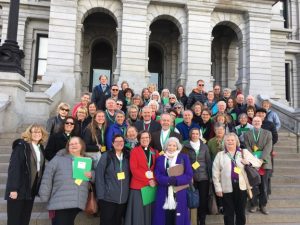 |
| Colorado Lutherans gather on the steps of the state Capitol on Feb. 15 before meeting with their legislators to talk about hunger in schools. |
The group asked legislators to support Senate Bill 18-013, a bipartisan measure that would
expand an existing state subsidy for reduced-price lunches through middle school, allowing kids to receive hot meals without worrying about the copay. Many families struggle to regularly pay the copay, leading kids to receive different meals or to not eat at all. This leaves kids hungry, ashamed, and not ready to learn. The bill passed its first committee and is awaiting an appropriations hearing before going to the Senate floor.
Rocky Mountain Synod Bishop Jim Gonia addressed the attendees in the morning, lifting up the importance of “incarnational advocacy” and the value of showing up in person to give a face to human needs and concerns. “For us, advocacy is not optional,” Bishop Gonia said of the Lutheran Christian witness: “It’s in our DNA.”
Attendees also heard from state Rep. Susan Lontine about her journey into public service. “I always wanted to help people,” she said, a personal commitment that led her into public policy and ultimately to elected office.
Minnesota
Tammy Walhof, Lutheran Advocacy–Minnesota tammy@lcppm.org
HOMES FOR ALL COALITION: Lutheran Advocacy-MN has been working with a subset of Homes for All Coalition members on our legislative agenda. Now we need your and your congregation’s help to make it a reality! Contact us for ideas, information, sample letters and talking points!
$150 million to provide Minnesotans with safe, stable and affordable housing
- $110 million in housing infrastructure bonds to create supportive rental housing, preserve housing and promote home-ownership
- $30 million in general obligation bonds to make improvements to the state’s public housing
- $10 million in the budget to prevent and end homelessness and promote affordable housing
UPCOMING EVENT:
FAITH AND CLEAN ENERGY CAMPAIGN: Lutheran Advocacy-MN with the Faith and Clean Energy Campaign is working on several non-partisan church and faith events. Would you like an event in your neck of the woods? If so, please call Tammy (651-238-6506). We need lots of action! (We need more signers on the faith campaign letter to legislators).
JRLC Day on the Hill (We are a sponsor!)
Tuesday, March 13 (8:30 a.m. – affordable housing session).
Central Presbyterian Church, St. Paul, Minn.
More information: jrlc.org/day-on-the-hill/details /
Registration: jrlc.org/day-on-the-hill/registration
First-time attendee? Contact LA-MN to participate for free(get code)
Southwest Metro Forum on Faith and Clean Energy
Thursday, March 15, 6:30-8:30 p.m.
Hosted by: Grace Lutheran Church
7800 West County Road 42, Apple Valley, Minn.
Renewing Energy: People, Planet, and Promise
Saturday, March 17, 9 a.m.-4 p.m.
St. Andrews Lutheran Church
Grand Rapids, Minn.
North Carolina
GeoRene Jones, Coordinator for Social Justice and Advocacy Ministry NC Synod
REDISTRICTING: Energized by recent U.S. Supreme Court actions regarding redistricting cases in both North Carolina and Pennsylvania, we are encouraged for state advocacy in efforts against legislative and judicial redistricting, as well as removal of executive branch authority with respect to our State Board of Elections. ELCA Lutherans appeared at court-required public hearings, voicing strong support for discarding proposed House and Senate maps drawn with the intent to impede voting by poor and minority residents. The 2017 legislative session stripped North Carolinians of their right to a primary election for judicial candidates. Legislative leaders continue to pursue judicial redistricting efforts that remove from office elected judges and district attorneys. Through our partnership with the North Carolina Council of Churches and non-partisan voter rights groups across the state, we are increasing the prophetic witness against discriminatory practices in public policy.
New Mexico
Ruth Hoffman, Lutheran Advocacy Ministry–New Mexico lutheranadvocacynm.org
2018 LEGISLATIVE SESSION: The 2018 legislative session is over, and bills are on the governor’s desk for action by March 7. LAM-NM’s work again focused on both funding and budget issues as well as legislation. There was some breathing room for the appropriations process since oil and gas prices have risen. New 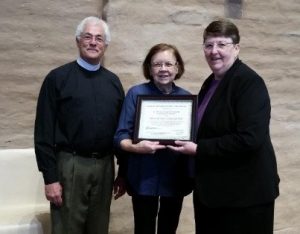 Mexico is overly dependent on the volatile oil and gas market, which makes state budget development very precarious. There were some increases in funding for affordable housing, child-care assistance, our state SNAP supplement, services for human trafficking victims and Medicaid. An effort to reinstate the death penalty was rebuffed as well as an effort to enact a right-to-work law. Unfortunately, the push to place a constitutional amendment that would greatly increase funding for early childhood education on the fall ballot failed to pass the Senate after passing the House. Action by the governor, who has line-item veto authority, on the state budget bill is expected during the next week.
Mexico is overly dependent on the volatile oil and gas market, which makes state budget development very precarious. There were some increases in funding for affordable housing, child-care assistance, our state SNAP supplement, services for human trafficking victims and Medicaid. An effort to reinstate the death penalty was rebuffed as well as an effort to enact a right-to-work law. Unfortunately, the push to place a constitutional amendment that would greatly increase funding for early childhood education on the fall ballot failed to pass the Senate after passing the House. Action by the governor, who has line-item veto authority, on the state budget bill is expected during the next week.
ADVOCATING CONGREGATION: St. Michael and All Angels Episcopal Church in Albuquerque was recognized as an “Advocating Congregation” as LAM-NM Director Ruth Hoffman presented a certificate to the Rev. Joe Britton and Ann Donahue on Jan. 25.
Ohio
Nick Bates, Hunger Network in Ohio Nick@hungernetohio.com
REDISTRICTING: Redistricting reform to May’s ballot! Please remember to vote May 8. Fair districts improve policy and foster service over political ideology. You can read our testimony here.
Ohioans will finally have the opportunity to improve the redistricting process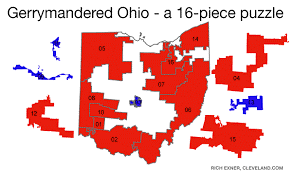 for congressional seats. Every 10 years, states redraw congressional districts. In Ohio (and many states) the party that has legislative power can draw the districts to benefit it.
for congressional seats. Every 10 years, states redraw congressional districts. In Ohio (and many states) the party that has legislative power can draw the districts to benefit it.
The League of Women Voters and others gathered hundreds of thousands of signatures to place their proposal on the November ballot. They accomplished this with an army of dedicated volunteers throughout Ohio. The Legislature – feeling the pressure – responded with a proposal. While the Legislature’s proposal is far from perfect, it is a much-needed improvement.
In 2001 and 2011, new data mapping software programs allowed very specific maps to be drawn to benefit one party by cracking communities into various districts. Summit County, for example, has four congressional representatives! However, Summit County (population over 500,00 0) has no congressional representative from the coun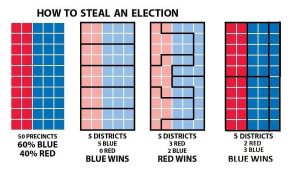 ty.
ty.
This process is known as gerrymandering and leaves candidates more concerned about primary challengers and currying favor with national donors and their political party. Redistricting reform will help place congressional priorities back onto the district.
If passed in May, Districts will continue to be drawn by the Legislature, but they will have rules to follow that will require districts to be compact and prevent numerous divisions. The new rules will also require minority party approval.
Pennsylvania
Lynn Fry, Lutheran Advocacy Ministry in Pennsylvania lutheranadvocacypa.org
ASHES TO GO: LAMPa volunteers and staff provided Ashes to Go at the state Capitol on Ash Wednesday, Feb. 14. Recipients expressed their appreciation for the opportunity for prayer and dialogue. Follow this link to Tracey DePasquale’s Lenten blog.
LUTHERAN DAY 2018: Preparation for Lutheran Day, Monday, May 21, continues. Keynote speakers for this annual event include: Sen. Stewart J. Greenleaf, state Senate Judiciary chair; and Dr. Richard Alley, the Evan Pugh Professor of geosciences and an associate of the Earth and Environmental Systems Institute at Penn State.
ELCA WORLD HUNGER: Hunger leaders in the ELCA Southeastern Pennsylvania Synod are planning a retreat to re-energize and reorganize their synod hunger team. LAMPa staff is thankful to have the opportunity to assist with the planning and equipping these leaders with resources.
SYNOD ASSEMBLY: This year’s Lower Susquehanna Synod Assembly will focus on eradicating hunger one relationship at a time. Tracey DePasquale is on the planning team.
ANTI-RACISM: LAMPa staff is working to share information and support synods’ organizing trips to the upcoming anti-racism events in Washington, D.C., April 3-5. For registration and bus transportation in the Southeastern Pennsylvania Synod, click here. For the Lower Susquehanna Synod, click here.
Southeastern Synod
Hilton Austin, synod advocacy director for Southeastern Synod
IMMIGRATION AND APPROPRIATIONS: On Jan. 15, we joined with Lutheran Services of Georgia for a Martin Luther King Jr. service day; there were many activities that day. The synod Advocacy Team set up a room for participants to write letters to their senators and congressional representatives concerning Dream Act 2017, along with letters concerning the 2018 budget as it applies to hunger. We mailed over 300 letters.
CRIMINAL JUSTICE REFORM: On Jan. 17, we joined with Atlantans Building Leadership for Empowerment for a news conference raising awareness about poverty-based detention. On Feb. 5, thanks to the work of many partners, the Atlanta City Council voted unanimously to end poverty-based detention. On Feb. 26, several of us attended Justice Day at the Capitol. SB407 passed the same day.
WORLD HUNGER: On Jan. 20-24, three of us went to Washington, D.C., for the ELCA World Hunger Leadership Gathering and visited our senators and congressmen to talk about the farm bill.
CARE FOR CREATION: On Feb. 2-4, we joined our Green Team and others from around the country at Lutheranch for a retreat on Care for Creation offered by Lutherans Restoring Creation.
UNTIL ALL ARE FED: On Feb. 10, we held our annual advocacy gathering at Redeemer in Atlanta with a focus on connecting our work with ending hunger. Pastors Karen Slappey and Jonathan Trapp wrapped our event in worship. Most inspiring was their use of Lectio Devina with Esther 4:1-17 and the discussion that ensued. Bishop Julian Gordy joined with Pastor Jonathan on guitars, and Pastor Karen led us in singing “Until All Are Fed.” Keith Gammage, Fulton County solicitor general, was our keynote speaker and spoke to us on his approach to restotative justice. Bishop Gordy spoke about loving our neighbor being more than acts of mercy, also being acts of justice by advocating for faith-based public policy. It was also our privilege to have John Johnson join us and speak to the group. Patti Austin spoke on domestic hunger, and Pastor Jonathan shared information from the World Hunger Leadership Gathering. We had a great lunch and welcomed some of our partner organizations. Pastor Ron Bonner spoke on current criminal justice issues. We closed with communion and “Christ Be Our Light.”
HUMAN TRAFFICKING: On Feb. 20, several of us attended the 2018 Anti-Sex Tafficking Lobby Day and talked with our state senators and representatives about proposed legislation. HB732 passed in the House on Feb. 23. HB293 passed on Feb. 27. Sb337 passed the Senate on Feb. 26
Wisconsin
Cindy Crane, Lutheran Office for Public Policy in Wisconsin loppw.org
CO-LEADING ON ADVOCACY: In February, LOPPW’s director co-led the se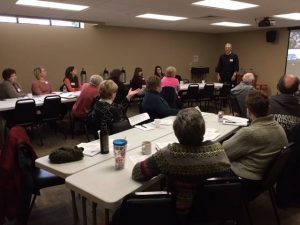 cond of two advocacy workshops with Bishop Gerald Mansholt. Bishop Mansholt focused on refugees, immigration and advocacy. The director used LOPPW’s new advocacy resource to discuss steps congregations can take to do advocacy. Between the Appleton and Waupaca trainings, more than 50 new participants were trained to be advocacy leaders in their congregations.
cond of two advocacy workshops with Bishop Gerald Mansholt. Bishop Mansholt focused on refugees, immigration and advocacy. The director used LOPPW’s new advocacy resource to discuss steps congregations can take to do advocacy. Between the Appleton and Waupaca trainings, more than 50 new participants were trained to be advocacy leaders in their congregations.
The Rev. Dione Miller added to the February event in Waupaca by talking about the power of stories. The director also met with the Global Missions in the East-Central Synod of Wisconsin team and a synod staff to discuss next steps.
NOW AVAILABLE ONLINE: Our Church Our World: Partnering with God’s Mission
BILLS ADDRESSED: The director organized teaming up with two faith-based coalition members to testify o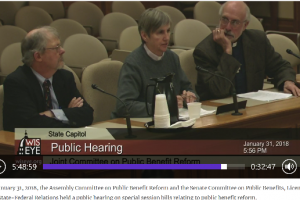 n several public-benefits bills.
n several public-benefits bills.
Media on LOPPW’s response to the proposed welfare reform included Advisory Council member Deb Martin’s letter to the editor published in Oshkosh and an interview with the director for a La Crosse radio station.
We also addressed a trafficking bill by contacting our constituents in two assembly districts and a bill related to wetlands.
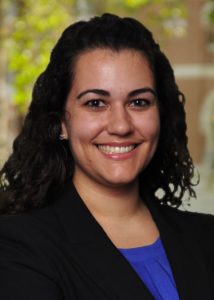 te moments in the church year take place during Lent. The first takes place on Ash Wednesday, when everyone receives the mark of the cross in ashes on their forehead and the pastor says, “Remember that you are dust and to dust you shall return.” The second is Good Friday at the end of the reading when the pastor quotes Jesus saying, “It is finished” and slams the big Bible shut. I have always looked forward to these moments, but I have never really though about why.
te moments in the church year take place during Lent. The first takes place on Ash Wednesday, when everyone receives the mark of the cross in ashes on their forehead and the pastor says, “Remember that you are dust and to dust you shall return.” The second is Good Friday at the end of the reading when the pastor quotes Jesus saying, “It is finished” and slams the big Bible shut. I have always looked forward to these moments, but I have never really though about why.
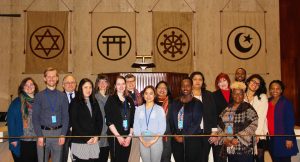










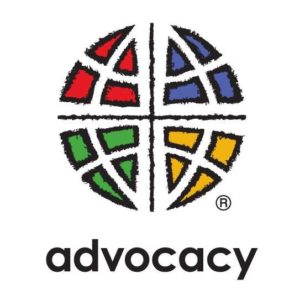
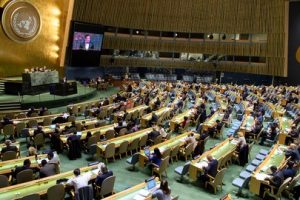
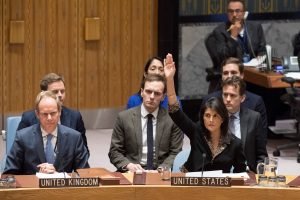
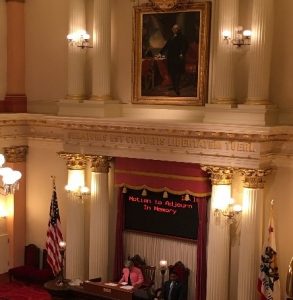
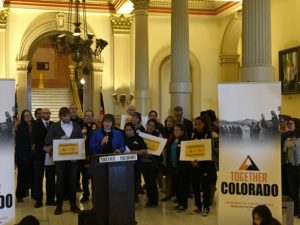
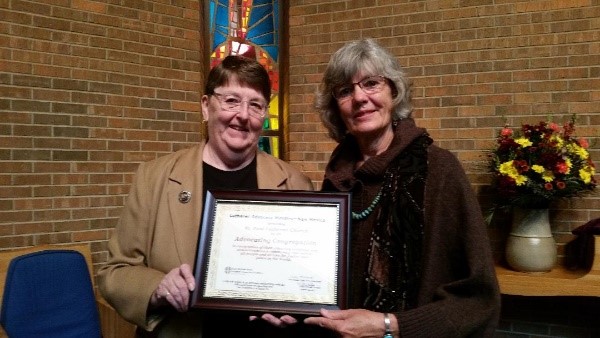
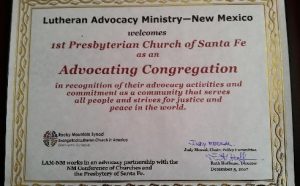 By the end of 2017 six congregations had submitted applications and two certificates had been presented by LAM-NM director, Ruth Hoffman. Fittingly, the first Advocating Congregation to be recognized was St. Paul Lutheran in Albuquerque. Several members of St. Paul were instrumental in the formation of Lutheran Advocacy Ministry in New Mexico in 1984. The second congregation recognized was 1st Presbyterian Church in Santa Fe which has been an ecumenical partner in advocacy for more than 20 years.
By the end of 2017 six congregations had submitted applications and two certificates had been presented by LAM-NM director, Ruth Hoffman. Fittingly, the first Advocating Congregation to be recognized was St. Paul Lutheran in Albuquerque. Several members of St. Paul were instrumental in the formation of Lutheran Advocacy Ministry in New Mexico in 1984. The second congregation recognized was 1st Presbyterian Church in Santa Fe which has been an ecumenical partner in advocacy for more than 20 years.
